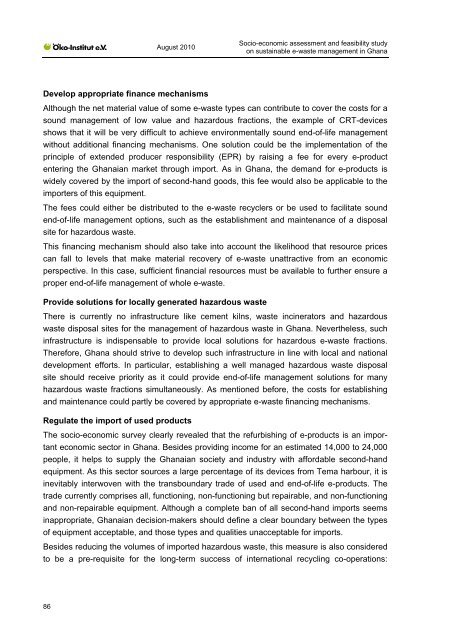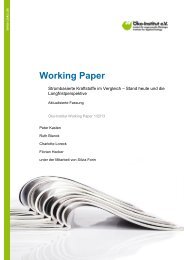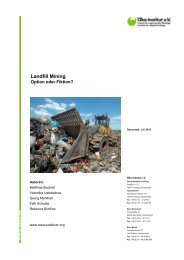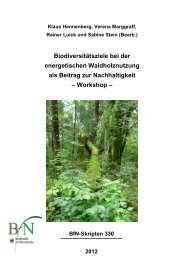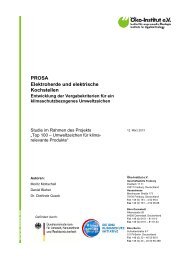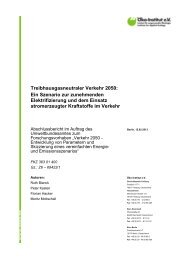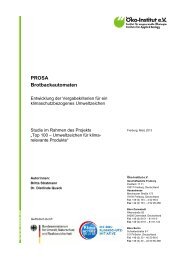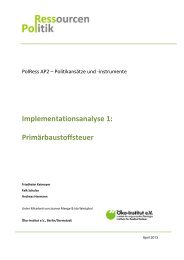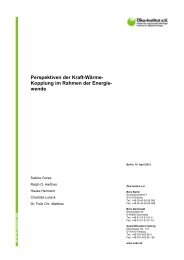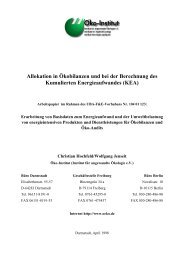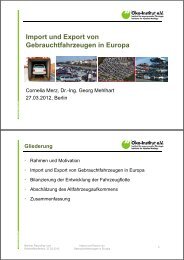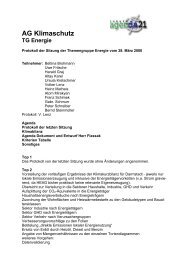Socio-economic assessment and feasibility study on - Öko-Institut eV
Socio-economic assessment and feasibility study on - Öko-Institut eV
Socio-economic assessment and feasibility study on - Öko-Institut eV
Create successful ePaper yourself
Turn your PDF publications into a flip-book with our unique Google optimized e-Paper software.
86<br />
August 2010<br />
<str<strong>on</strong>g>Socio</str<strong>on</strong>g>-<str<strong>on</strong>g>ec<strong>on</strong>omic</str<strong>on</strong>g> <str<strong>on</strong>g>assessment</str<strong>on</strong>g> <str<strong>on</strong>g>and</str<strong>on</strong>g> <str<strong>on</strong>g>feasibility</str<strong>on</strong>g> <str<strong>on</strong>g>study</str<strong>on</strong>g><br />
<strong>on</strong> sustainable e-waste management in Ghana<br />
Develop appropriate finance mechanisms<br />
Although the net material value of some e-waste types can c<strong>on</strong>tribute to cover the costs for a<br />
sound management of low value <str<strong>on</strong>g>and</str<strong>on</strong>g> hazardous fracti<strong>on</strong>s, the example of CRT-devices<br />
shows that it will be very difficult to achieve envir<strong>on</strong>mentally sound end-of-life management<br />
without additi<strong>on</strong>al financing mechanisms. One soluti<strong>on</strong> could be the implementati<strong>on</strong> of the<br />
principle of extended producer resp<strong>on</strong>sibility (EPR) by raising a fee for every e-product<br />
entering the Ghanaian market through import. As in Ghana, the dem<str<strong>on</strong>g>and</str<strong>on</strong>g> for e-products is<br />
widely covered by the import of sec<strong>on</strong>d-h<str<strong>on</strong>g>and</str<strong>on</strong>g> goods, this fee would also be applicable to the<br />
importers of this equipment.<br />
The fees could either be distributed to the e-waste recyclers or be used to facilitate sound<br />
end-of-life management opti<strong>on</strong>s, such as the establishment <str<strong>on</strong>g>and</str<strong>on</strong>g> maintenance of a disposal<br />
site for hazardous waste.<br />
This financing mechanism should also take into account the likelihood that resource prices<br />
can fall to levels that make material recovery of e-waste unattractive from an <str<strong>on</strong>g>ec<strong>on</strong>omic</str<strong>on</strong>g><br />
perspective. In this case, sufficient financial resources must be available to further ensure a<br />
proper end-of-life management of whole e-waste.<br />
Provide soluti<strong>on</strong>s for locally generated hazardous waste<br />
There is currently no infrastructure like cement kilns, waste incinerators <str<strong>on</strong>g>and</str<strong>on</strong>g> hazardous<br />
waste disposal sites for the management of hazardous waste in Ghana. Nevertheless, such<br />
infrastructure is indispensable to provide local soluti<strong>on</strong>s for hazardous e-waste fracti<strong>on</strong>s.<br />
Therefore, Ghana should strive to develop such infrastructure in line with local <str<strong>on</strong>g>and</str<strong>on</strong>g> nati<strong>on</strong>al<br />
development efforts. In particular, establishing a well managed hazardous waste disposal<br />
site should receive priority as it could provide end-of-life management soluti<strong>on</strong>s for many<br />
hazardous waste fracti<strong>on</strong>s simultaneously. As menti<strong>on</strong>ed before, the costs for establishing<br />
<str<strong>on</strong>g>and</str<strong>on</strong>g> maintenance could partly be covered by appropriate e-waste financing mechanisms.<br />
Regulate the import of used products<br />
The socio-<str<strong>on</strong>g>ec<strong>on</strong>omic</str<strong>on</strong>g> survey clearly revealed that the refurbishing of e-products is an important<br />
<str<strong>on</strong>g>ec<strong>on</strong>omic</str<strong>on</strong>g> sector in Ghana. Besides providing income for an estimated 14,000 to 24,000<br />
people, it helps to supply the Ghanaian society <str<strong>on</strong>g>and</str<strong>on</strong>g> industry with affordable sec<strong>on</strong>d-h<str<strong>on</strong>g>and</str<strong>on</strong>g><br />
equipment. As this sector sources a large percentage of its devices from Tema harbour, it is<br />
inevitably interwoven with the transboundary trade of used <str<strong>on</strong>g>and</str<strong>on</strong>g> end-of-life e-products. The<br />
trade currently comprises all, functi<strong>on</strong>ing, n<strong>on</strong>-functi<strong>on</strong>ing but repairable, <str<strong>on</strong>g>and</str<strong>on</strong>g> n<strong>on</strong>-functi<strong>on</strong>ing<br />
<str<strong>on</strong>g>and</str<strong>on</strong>g> n<strong>on</strong>-repairable equipment. Although a complete ban of all sec<strong>on</strong>d-h<str<strong>on</strong>g>and</str<strong>on</strong>g> imports seems<br />
inappropriate, Ghanaian decisi<strong>on</strong>-makers should define a clear boundary between the types<br />
of equipment acceptable, <str<strong>on</strong>g>and</str<strong>on</strong>g> those types <str<strong>on</strong>g>and</str<strong>on</strong>g> qualities unacceptable for imports.<br />
Besides reducing the volumes of imported hazardous waste, this measure is also c<strong>on</strong>sidered<br />
to be a pre-requisite for the l<strong>on</strong>g-term success of internati<strong>on</strong>al recycling co-operati<strong>on</strong>s:


